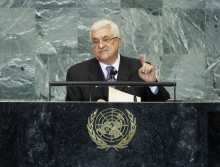The hate-filled, violence-promoting speech from the Hamas leadership this past weekend was nothing new. Hamas has long advocated malice with no offer of permanent reconciliation towards Israel. But while the recent speeches should have shocked no one, the dark, secret reality is that Palestinian President Mahmoud Abbas is also unwilling to make peace with Israel. And there’s no hope for the situation to change until the Palestinian leadership does.
As Israeli Prime Minister Benjamin Netanyahu so aptly put it, the enemies of Israel unveiled their true face again at the events celebrating the 25th anniversary of the Hamas movement. The terror group’s political leader, not their military leader but the political one, actually boldly told the crowds that violence was the “right way.”
The Hamas military wing website quoted him as saying on Saturday, “The armed resistance is the real and the right way to liberate the land and restore the rights.”
If that wasn’t enough, Khaled Meshaal was quoted by the Palestinian Ma’an News Agency as claiming every inch of “Palestine,” which he made clear was not just the West Bank and the Gaza Strip, but “from the river to the sea and from the south to the north.”
He was quoted as sounding quite determined never to reach peace with Israel. “There will be no concession on an inch of the land. We will never recognize the legitimacy of the Israeli occupation and therefore there is no legitimacy for Israel, no matter how long it will take.”
This comes on the heels of the Hamas Twitter feed telling “Zionists”—Jews who actively believe they have a right to live in their ancient homeland—to “go home” to Germany.
Remember, these aren’t hidden discussions in basements being leaked to the press. These are Tweets in English and speeches to crowds. No matter how often Meshaal may claim to be willing to accept a Palestinian state on the 1967 lines, he has made quite clear those words do not mean he will accept the permanency of the State of Israel. “No matter how long it will take”—if a short-term quasi-peace is necessary to ultimately drive the Jews into the sea, Meshaal will do it.
And it is that underlying, undergirding, defining hatred that makes any piece of paper Israel signs with Palestinian leadership so worthless.
But what about Abbas? He’s renounced violence. Even admitted privately that Palestinian refugees can’t flood Israel. Even admitted he won’t lay claim to his homeland in the Israeli town of Safed.
But those words are as meaningless as Meshaal offering to take the 1967 lines.
The truth is that people do what they want to do. And for over two years Abbas has refused to resume peace talks with Israel. He has rejected every offer to negotiate. He has escalated the diplomacy against Israel. And he has never urged his people to heal and forgive Israel.
Instead he spews invective at the United Nations. Palestinian Media Watch has made a business of translating the wealth of anti-Israel, rejectionist media sent to the Palestinian people—and that’s media under Abbas’ control. Need proof? Just visit Palwatch.org and see what the Palestinian people are being fed. It’s not peace.
What’s really needed is for a Palestinian leader to finally say, “Enough. The conflict is over, we accept Israel and it’s time to bring healing.”
Nelson Mandela finally learned this lesson and tried to heal the gaping wound in South Africa. Egypt’s Anwar Sadat even took the practical step of visiting Jerusalem to proclaim peace to Israel.
But Abbas? He goes to New York to declare Israel a monster. His officials threaten to drag Jerusalem before the Security Council.
The United States has a rare chance to try and convince Abbas to change his ways by using the UN move by the Palestinians as justification to withhold funding. The West Bank is economically fragile. Protests already broke out earlier this year. Given six months of a thread-bare government cupboard and maybe they’ll get the message. Or at least maybe they’ll try. Or maybe someone else will rise up who will.
Despite the existence of the Israel-Palestinian conflict in the 1980s, Palestinians could work in Jerusalem. Settlers even made friends with Palestinians in Gaza. The First Intifada helped change the perspective to one of widespread conflict and tight security barriers between the sides. The Second Intifada brought suicide bombers to Jewish public busses and bars.
As a result, an entire generation of Israelis has been force-fed the image of the Palestinian terrorist who wants to kill them—an image given them by the Palestinians themselves.
It is not Netanyahu who needs to make a gesture for peace. It’s Abbas who needs to prove he wants peace and not just a diplomatic means to continue the conflict. To prove he isn’t just as willing as Hamas to take as much time as it takes to drive Israel out of the Middle East.
Words are cheap. Actions speak louder. And right now Abbas’ actions are speaking as loud as Hamas’ words.
(By Joshua Spurlock, www.themideastupdate.com, December 9, 2012)

